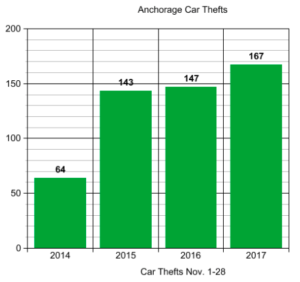Senate Bill 54 went into effect early Monday, with Gov. Bill Walker signing it into law upon the recommendation of the Department of Law, which said it will withstand a legal challenge by the ACLU.
“The passage of SB 54 helps to build a Safer Alaska,” Gov. Walker said in a press release. “While some portions of the legislation may need to be addressed by the court system, this law is an important first step in returning some important tools to the law enforcement community.”
Walker did not elaborate on which aspects might be addressed by the court system, nor in what manner they would be addressed, but he is clearly uncomfortable about the bill he signed. The ACLU of Alaska has threatened a lawsuit that, if successful, could repeal SB54 and extend the crime wave that has swept over Alaska. That lawsuit would take place during Walker’s re-election year.
SB 54 has these main provisions:
- Class C Felonies: The presumptive sentencing ranges are increased. First offenses changed from receiving mere probation to having up to two years of jail time. Second offenses went from 1-3 year sentences to up to 4 years. Third offenses remain unchanged. According to the governor, the courts should now be more willing to hold offenders on bail for a first C felony conviction, because the sentence can include active jail time.
- Theft in the Fourth Degree – This is a Class B misdemeanor for theft of something valued under $50. SB 54 created a graduated sentencing structure for theft of property valued at less than $250. For a first conviction, a sentence can include up to five days of jail time. For a second conviction, up to 10 days and for a third conviction, up to 15 days. On a fourth conviction, the offense is upgraded to a Class A misdemeanor (theft in the third degree), which under most circumstances is punishable by up to 30 days of jail time.
- Violating Conditions of Release – SB 54 restored this to a misdemeanor, punishable with up to five days of jail time. “Returning this offense to a misdemeanor clarifies for judges and law enforcement alike that a person may be arrested and held until bail is set on the new offense,” the governor said.
- Mandatory Probation for Sex Offenders – SB 54 reestablished a mandatory period of probation for sex offenders. Unclassified felonies receive 15 years of probation, Class A or B felonies will receive 10 years of probation and Class C felonies, the lowest level, will get 5 years of probation.
- Sex Trafficking Adjustments – SB 54 amended the statutes to ensure those who profit from other sex workers can be held accountable as sex traffickers.
The ACLU asserts that the presumptive sentencing range for first time convictions of Class C felonies of zero to two years creates a condition where first time Class C and Class B felony presumptive sentence ranges are the same.
That identical sentencing range presents a problem for the ACLU, which says it will be forced to sue because:
“First, the new Class C felony presumptive ranges would violate a due process requirement under both state and federal constitutions that sentencing ranges bear a substantial relationship to legislative policy. The entire concept of graduated classes of offenses is to ensure that more serious crimes are sentenced more harshly. In reviewing the class of offenses for C felonies and B felonies, which would have identical presumptive penalties, it is likely the court would conclude that the sentencing for each of those classifications is arbitrary.”
“A second, related issue with Amendment 12 is the that sentences must bear some proportional relationship to the offense under the constitutional prohibitions of cruel and unusual punishment. “It is a precept of justice that punishment for crime should be graduated in proportion to the offense.” Those punishments are arbitrary when, as succinctly described by one court, “similar offenses are compared and conduct that creates a less serious threat to public health and safety is punished more harshly.”
But the ACLU opposed SB 54 from the beginning, writing in July of 2016 that: “In July 2016, Governor Walker signed SB 91, a comprehensive criminal justice reform bill, into law. The ACLU of Alaska commended the Governor and Legislature for adopting policies that make our criminal laws smarter, our justice system better, and our communities safer.
“SB 54, sponsored by Senator John Coghill (R-Fairbanks), threatens to roll back some of the reforms achieved by SB 91 in criminal sentencing and penalties for low-level crimes and first-time offenders. We oppose the bill and wrote to the Senate Judiciary and Finance committees explaining our concerns.”
MEANWHILE, CAR THEFTS STILL RISING
Car thieves may not have gotten the word yet about the crackdown and are still busy this November, according to LexisNexis crime data:
